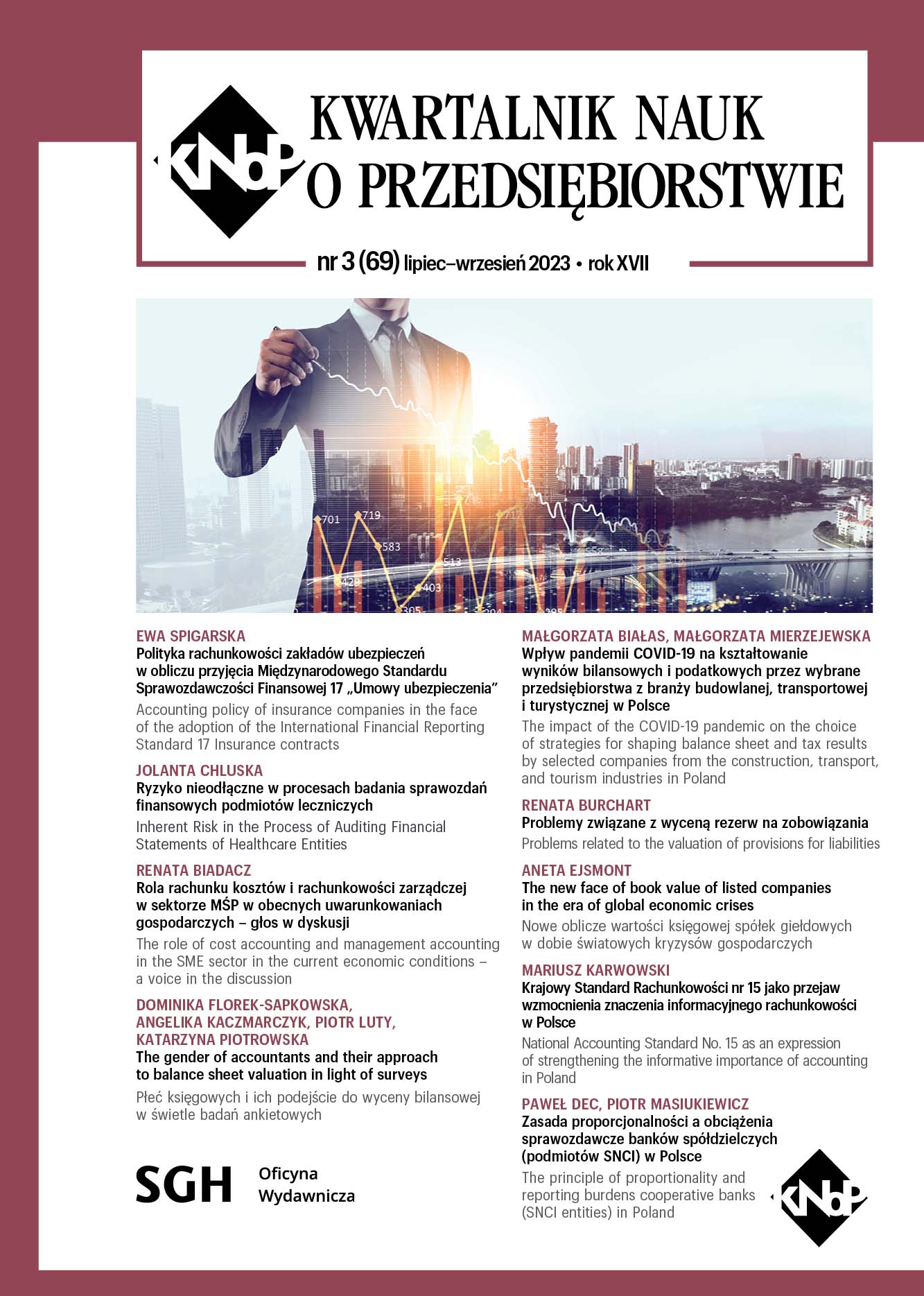National Accounting Standard No. 15 as an expression of strengthening the informative importance of accounting in Poland
Main Article Content
Abstract
Revenue from the sale of goods is an important component of the statement of profit or loss and other comprehensive income (income statement) and at the same time an inherent part of the business model. The aim of the article is to identify premises proving the strengthening of the informative importance of financial statements in connection with the implementation of KSR 15. The article indicates that, on the one hand, unlike IFRS 15, the Polish standard does not consistently distinguish between revenue from the sale of goods recognized at a point in time or over time. However, on the other hand, in order to correctly recognise these revenues, the new standard requires i.a. an analysis of the commercial substance of the contract concluded between the supplier and the buyer of the goods. Such focus on contracts with customers may enable to assess the implementation of the business model on the basis of the financial statements by e.g. identifying different performance obligations (despite the absence of specific contractual provisions) under the same contract and allocating remuneration to them. Despite the indicated difference in relation to IFRS 15, it can be considered that KSR 15 is an expression of the impact of international standards on accounting in Poland and the strengthening its informative importance.
Downloads
Article Details

This work is licensed under a Creative Commons Attribution 4.0 International License.
The author of the article declares that the submitted article does not infringe the copyrights of third parties. The author agrees to subject the article to the review procedure and to make editorial changes. The author transfers, free of charge, to SGH Publishing House the author's economic rights to the work in the fields of exploitation listed in the Article 50 of the Act of 4 February 1994 on Copyright and Related Rights – provided that the work has been accepted for publication and published.
SGH Publishing House holds economic copyrights to all content of the journal. Placing the text of the article in a repository, on the author's home page or on any other page is allowed as long as it does not involve obtaining economic benefits, and the text will be provided with source information (including the title, year, number and internet address of the journal).
References
Brzóska J. [2009], Model biznesowy – współczesna forma modelu organizacyjnego zarządzania przedsiębiorstwem, „Organizacja i Zarządzanie. Kwartalnik Naukowy”, nr 2(6), s. 5–23.
Dyrektywa Parlamentu Europejskiego i Rady 2013/34/UE z dnia 26.06.2013 r. w sprawie rocznych sprawozdań finansowych, skonsolidowanych sprawozdań finansowych i powiązanych sprawozdań niektórych rodzajów jednostek, zmieniająca dyrektywę Parlamentu Europejskiego i Rady 2006/43/WE oraz uchylająca dyrektywy Rady 78/660/EWG i 83/349/EWG (Dz.Urz. UE L 2013, nr 182/19 z późn. zm.).
EFRAG, ANC, FRC [2013], The role of the business model in financial statements. Research paper, European Financial Reporting Advisory Group, Autorité des Normes Comptables, Financial Reporting Council.
Falencikowski T. [2013], Spójność modeli biznesu. Koncepcja i pomiar, CeDeWu, Warszawa.
https://asc.fasb.org/ (data pobrania: 20.02.2023).
ICAEW [2010], Business models in accounting: the theory of the firm and financial reporting. Information for better markets initiative, The Institute of Chartered Accountants in England and Wales, London.
Johnson M.W., Christensen C.M., Kagermann H. [2008], Reinventing Your Business Model, „Harvard Business Review”, November–December, s. 57–68.
Jones R.C. [2014], Considering an entity’s business model in financial reporting, „Austin Journal of Accounting, Audit and Finance Management”, vol. 1(1), s. 1–5.
Karwowski M. [2016], MSSF 15 „Przychody z umów z klientami” a ocena realizacji modelu biznesu, „Studia Ekonomiczne. Zeszyty Naukowe Wydziałowe Uniwersytetu Ekonomicznego w Katowicach”, nr 285, s. 161–170.
Karwowski M. [2018], Model biznesu w sprawozdaniu finansowym. Ograniczenia informacyjne, Oficyna Wydawnicza SGH, Warszawa.
Kieso D.E., Weygandt J.J., Warfield T.D. [2008], Intermediate Accounting, Twelfth Edition, John Wiley & Sons, Hoboken, New Jersey.
Komunikat Ministra Finansów z dnia 20.07.2022 r. w sprawie ogłoszenia uchwały Komitetu Standardów Rachunkowości w sprawie przyjęcia Krajowego Standardu Rachunkowości Nr 15 „Przychody ze sprzedaży wyrobów, półproduktów, towarów i materiałów”.
Krajowy Standard Badania 240 w brzmieniu Międzynarodowego Standardu Badania 240, Obowiązki biegłego rewidenta podczas badania sprawozdania finansowego dotyczące oszustw, Załącznik nr 1.5 do uchwały Nr 3430/52a/2019 Krajowej Rady Biegłych Rewidentów z dnia 21.03.2019 r.
Kuciński K. [2007], Doktoranci o metodologii nauk ekonomicznych, Oficyna Wydawnicza SGH, Warszawa.
Międzynarodowy Standard Sprawozdawczości Finansowej 15, Przychody z umów z klientami, Rozporządzenie Komisji (WE) nr 1126/2008 z dnia 3.11.2008 r. przyjmujące określone międzynarodowe standardy rachunkowości zgodnie z rozporządzeniem (WE) nr 1606/2002 Parlamentu Europejskiego i Rady (z późn. zm.).
Osterwalder A., Pigneur Y. [2012], Tworzenie modeli biznesowych. Podręcznik wizjonera, Wydawnictwo Helion, Gliwice.
Singleton-Green B. [2014], Should financial reporting reflect firms’ business models? What accounting can learn from the economic theory of the firm, „Journal of Management and Governance”, vol. 18, s. 697–706.
Teece D.J. [2010], Business models, business strategy and innovation, „Long Range Planning”, vol. 43(2–3), doi:10.1016/j.lrp.2009.07.003, s. 172–194.
Trzpioła K. [2023], KSR 15 Przychody ze sprzedaży wyrobów, półproduktów, towarów i materiałów (cz. I) – Omówienie, „Rachunkowość”, nr 2, s. 13–21.
Ustawa z dnia 23.04.1964 r. Kodeks cywilny (Dz.U. 2022, poz. 1360 z późn. zm.).
Ustawa z dnia 15.02.1992 r. o podatku dochodowym od osób prawnych (Dz.U. 2022, poz. 2587 z późn. zm.).
Ustawa z dnia 29.09.1994 r. o rachunkowości (Dz.U. 2023, poz. 120 z późn. zm.).

